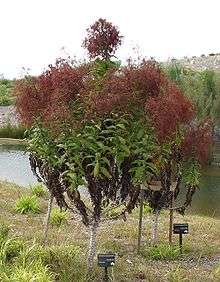Calomeria
| Calomeria | |
|---|---|
 | |
| Calomeria amaranthoides | |
| Scientific classification | |
| Kingdom: | Plantae |
| (unranked): | Angiosperms |
| (unranked): | Eudicots |
| (unranked): | Asterids |
| Order: | Asterales |
| Family: | Asteraceae |
| Tribe: | Gnaphalieae |
| Genus: | Calomeria Vent. |
| Type species | |
| Calomeria amaranthoides Vent. | |
| Synonyms[1] | |
| |
Calomeria is a plant genus in the dandelion family.[2]
- Accepted species[1]
- Calomeria africana (S.Moore) Heine - Mozambique
- Calomeria amaranthoides Vent. - New South Wales and Victoria in Australia
- formerly included[3]
several species now in other genera, including Basedowia, Cassinia, Helichrysum, Humeocline and Thiseltonia.
Description
Calomeria amaranthoides is a tall, fragrant biennial herb, growing to 3.5 metres in height. It has sticky stems and leaves which are green above and whitish beneath and are up to 15 cm long and 5 cm wide. Its flowers appear in large brown to red plumes in the summer (January to April in its native range).[4]
Taxonomy
The genus was first formally described by E.P. Ventenat in Jardin de la Malmaison in 1804.[3]
References
- 1 2 Flann, C (ed) 2009+ Global Compositae Checklist
- ↑ "Calomeria amranthoides Vent.". PlantNET - New South Wales Flora Online. Royal Botanic Gardens & Domain Trust, Sydney Australia. Retrieved 2008-04-14.
- 1 2 "Calomeria". Australian Plant Name Index (APNI), IBIS database. Centre for Plant Biodiversity Research, Australian Government, Canberra. Retrieved 2008-04-14.
- ↑ Costermans, L. (1981). Native Trees and Shrubs of South-eastern Australia. Australia: Rigby. ISBN 072701403X.
This article is issued from Wikipedia - version of the 12/21/2015. The text is available under the Creative Commons Attribution/Share Alike but additional terms may apply for the media files.